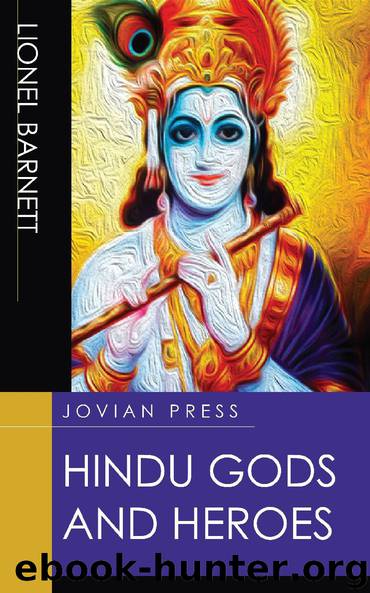Hindu Gods and Heroes by Lionel Barnett

Author:Lionel Barnett
Language: eng
Format: epub
Publisher: Pronoun
VISHṆU-KṚISHṆA
WE NOW ENTER UPON an age in which the old gods, Indra and Brahmā, retire to the background, while Vishṇu and Śiva stand in the forefront of the stage.
The Hindus are of the same opinion as the Latin poet: ferrea nunc aetas agitur. We are now living in an Iron Age, according to them; and it began in the year 3102 b.c., shortly after the great war described in the Mahābhārata. The date 3102, I need hardly remark, is of no historical value, being based merely upon the theories of comparatively late astronomers; but the statement as a whole is important. The Great War marks an epoch. It came at the end of what may be called the pre-historic period, and was followed by a new age. To be strictly correct, we must say that the age which followed the Great War was not new in the sense that it introduced any startling novelties that had been unknown previously; but it was new in the sense that after the Great War India speedily became the India that we know from historical records. A certain fusion of different races, cultures, and ideals had to take place in order that the peculiar civilisation of India might unfold itself; and this fusion was accomplished about the time of the Great War, and partly no doubt by means of the Great War, some ten centuries before the Christian era.
The story of the Great War is told with a wild profusion of mythical and legendary colouring in the Mahābhārata, an epic the name of which means literally “The Great Tale of the Bharata Clan.” It relates how the blind old King Dhṛitarāshṭra of Hastināpura had a hundred sons, known as the Kuru or Kaurava princes, the eldest of whom was Duryōdhana, and Dhṛitarāshṭra’s brother Pāṇḍu had five sons, the Pāṇḍava brethren; how the Pāṇḍavas were ousted by the Kauravas from the kingdom, the eldest Pāṇḍava prince Yudhishṭhira having been induced to stake the fortunes of himself and his brethren on a game of dice, in which he was defeated; how the five Pāṇḍavas, with their common wife Draupadī (observe this curious and ugly feature of polyandry, which is quite opposed to standard Hindu morals, but is by no means unparalleled in early Indian literature ) retired into exile for thirteen years, and then came back with a great army of allies, and after fierce and bloody battles with the Kauravas and their supporters in the plain of Kurukshētra at last gained the victory, slew the Kauravas, and established Yudhishṭhira as king in Hastināpura. Among the Pāṇḍavas the leading part is played by the eldest, Yudhishṭhira, and the third, Arjuna; of the others, Bhīma, the second, is a Hercules notable only for his strength, courage, and fidelity, while the twins Nakula and Sahadēva are colourless figures. Kṛishṇa plays an important part in the story; for on the return of the Pāṇḍavas to fight the Kauravas he accompanies Arjuna as his charioteer, and on the eve of
Download
This site does not store any files on its server. We only index and link to content provided by other sites. Please contact the content providers to delete copyright contents if any and email us, we'll remove relevant links or contents immediately.
| Chakras | Gandhi |
| History | Rituals & Practice |
| Sacred Writings | Sutras |
| Theology |
Fingersmith by Sarah Waters(2532)
Kundalini by Gopi Krishna(2180)
Wheels of Life by Anodea Judith(2144)
Indian Mythology by Devdutt Pattanaik(1936)
The Bhagavad Gita by Bibek Debroy(1926)
The Yoga of Jesus: Understanding the Hidden Teachings of the Gospels by Paramahansa Yogananda(1847)
Autobiography of a Yogi (Complete Edition) by Yogananda Paramahansa(1823)
The Man from the Egg by Sudha Murty(1805)
The Book of Secrets: 112 Meditations to Discover the Mystery Within by Osho(1659)
Chakra Mantra Magick by Kadmon Baal(1638)
The Sparsholt Affair by Alan Hollinghurst(1585)
Sparks of Divinity by B. K. S. Iyengar(1530)
Gandhi by Ramachandra Guha(1528)
Avatar of Night by Tal Brooke(1519)
Karma-Yoga and Bhakti-Yoga by Swami Vivekananda(1488)
The Bhagavad Gita (Classics of Indian Spirituality) by Eknath Easwaran(1477)
The Spiritual Teaching of Ramana Maharshi by Ramana Maharshi(1426)
Hindoo Holiday by J. R. Ackerley(1374)
Hinduism: A Very Short Introduction (Very Short Introductions) by Knott Kim(1372)
